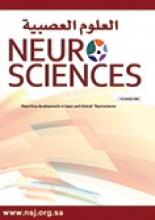Abstract
Objectives: To determine the prevalence and pattern of complementary and alternative medicine (CAM) use and the CAM types used by stroke patients in Jeddah, Kingdom of Saudi Arabia.
Methods: This cross-sectional study included 152 ischemic stroke survivors who visited King Fahad Hospital, Jeddah, Kingdom of Saudi Arabia, between January 2018 and December 2019. Phone-based and face-to-face surveys were conducted. Data on the patients’ demographic characteristics, their use of CAM, and their pattern of CAM use were gathered
Results: Ninety (59.2%) stroke patients used CAM, mainly cauterization (29.61%) and Quran recitation by a religious sheik (28.95%). Most of the patients (72.22%) used CAM post-hospitalization and within less than one month from stroke onset (62.22%). A minority (6.67%) of the patients stopped their medication while on CAM. Some patients (25.56% to 31.11%) discussed with their physician their use of CAM. The CAM users reported a subjective improvement in their physical weakness (45.6%) and psychological wellbeing (62.2%). The patients learned about CAM mainly from their relatives and friends (96.7%), and the most common reason for their CAM use was their belief in this intervention (42.22%).
Conclusion: The CAM use was prevalent among our cohort of Saudi ischemic stroke patients, and cauterization and Quran recitation were the most commonly used CAM interventions. An effective communication was lacking between the medical professionals and the stroke patients as regards CAM use despite the interest of the patients in this intervention.
Footnotes
Disclosure. Authors have no conflict of interests, and the work was not supported or funded by any drug company.
- Received May 24, 2020.
- Accepted July 10, 2020.
- Copyright: © Neurosciences
Neurosciences is an Open Access journal and articles published are distributed under the terms of the Creative Commons Attribution-NonCommercial License (CC BY-NC). Readers may copy, distribute, and display the work for non-commercial purposes with the proper citation of the original work.






